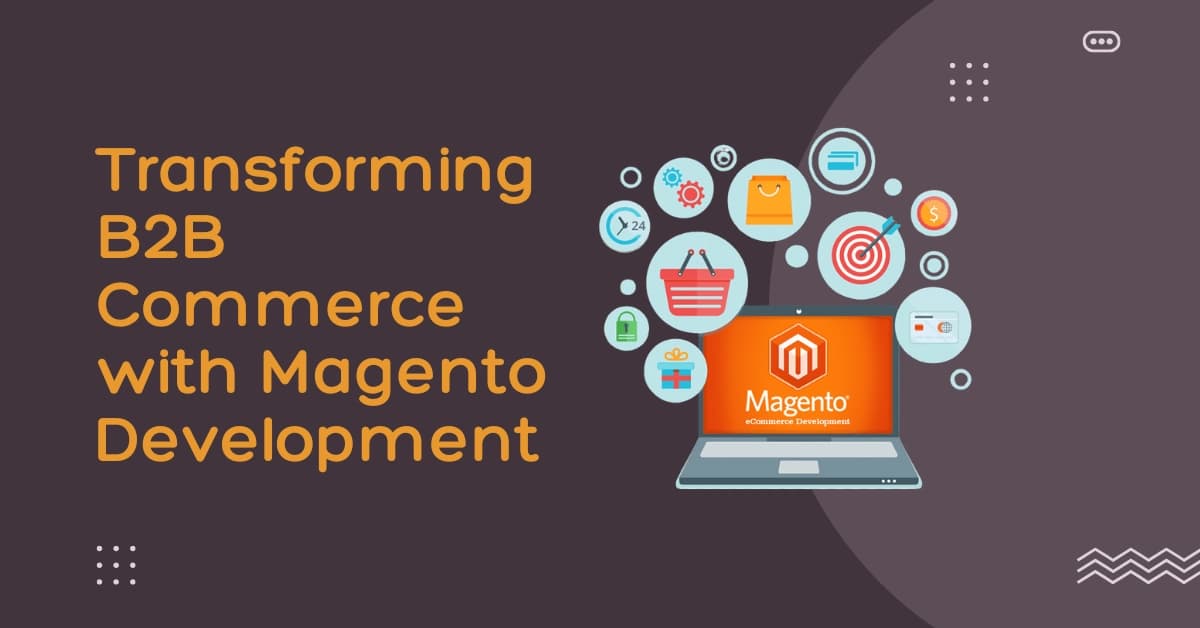B2B Commerce with Magento: Latest Features and Integrations
Discover how Magento B2B Commerce empowers enterprises with advanced features, integrations, and scalable solutions for modern B2B businesses.

The world of B2B commerce has transformed dramatically in the last few years. No longer are businesses content with clunky portals, manual ordering systems, or limited integrations. Modern B2B buyers expect seamless, personalized, and efficient experiences — much like their B2C counterparts.
That’s where Magento Development (now part of Adobe Commerce) shines. Known for its flexibility, scalability, and enterprise-ready features, Magento has become a go-to platform for organizations looking to deliver powerful B2B Magento solutions.
In this article, we’ll dive deep into the latest Magento B2B features, discuss how Magento integrations for B2B create smoother operations, and explore why enterprise Magento development is increasingly the backbone of digital transformation in business-to-business commerce.
Why Magento for B2B Commerce?
Magento (Adobe Commerce) has built a reputation as a robust enterprise eCommerce platform. For B2B organizations, its flexibility is unmatched — offering tailored workflows, advanced catalog management, and strong integration capabilities.
Unlike traditional eCommerce platforms that focus primarily on consumer-facing transactions, Magento B2B Commerce addresses the unique complexities of business-to-business sales. These include:
-
Multi-level user permissions
-
Custom pricing and contracts
-
Quote management and approval workflows
-
Bulk ordering and requisition lists
-
Integration with ERP and CRM systems
According to Adobe’s official documentation on Magento B2B features, businesses using Magento benefit from built-in account management tools, flexible payment methods, and automated ordering processes — all essential for scaling B2B operations.
Latest Magento B2B Features You Should Know
Magento continues to evolve rapidly, and its latest B2B features are designed to align with the growing expectations of digital-first buyers. Here are some of the most impactful updates:
1. Company Accounts and User Roles
B2B organizations often have multiple buyers, managers, and decision-makers. Magento allows for company accounts with hierarchical structures, giving businesses the ability to assign roles and permissions to different users.
2. Custom Pricing and Negotiable Quotes
With negotiable quotes, buyers can request pricing directly within the platform, and sales reps can respond with discounts or custom terms. This mirrors the traditional B2B negotiation process but digitizes it for faster turnaround.
3. Requisition Lists and Quick Ordering
For repeat buyers, requisition lists streamline bulk orders. The quick order feature lets users enter SKUs or upload CSV files, saving time for large-volume purchases.
4. Advanced Payment Options
From purchase orders to deferred payments, Magento supports multiple payment workflows tailored to business buyers.
5. PunchOut Catalogs
PunchOut integration with procurement systems allows buyers to shop in a familiar eCommerce environment while syncing data back into their internal procurement tools.
These features highlight why Magento development for businesses is a strategic investment for enterprises looking to digitize complex purchasing workflows.
The Role of Magento Integrations in B2B Commerce
One of Magento’s greatest strengths lies in its ability to integrate with third-party systems. In B2B, integration is not just a convenience — it’s a necessity.
ERP Integration
Integrating Magento with ERP systems like SAP or Oracle ensures seamless management of inventory, pricing, and order fulfillment. This reduces errors and keeps operations synchronized.
CRM Integration
By connecting Magento with CRMs like Salesforce or HubSpot, businesses gain visibility into customer behavior and can deliver personalized B2B experiences.
Payment & Shipping Integrations
B2B transactions often involve high-value orders and specific shipping requirements. Magento supports integrations with secure payment gateways (PayPal, Stripe, Authorize.Net) and enterprise shipping providers.
Marketing Automation
Magento can be integrated with marketing automation tools like Marketo or Mailchimp, enabling personalized campaigns targeted at B2B buyers.
Industry reports, such as the Forrester Wave: B2B Commerce Suites (Forrester Research), confirm that integrated commerce platforms like Magento are leading the way in B2B digital adoption.
Benefits of Magento B2B Commerce for Enterprises
When evaluating enterprise Magento development, businesses often focus on outcomes rather than just features. Here are the key benefits:
-
Scalability – Handle complex catalogs, large customer databases, and high-volume transactions.
-
Flexibility – Customize workflows, pricing, and checkout experiences to suit your business.
-
Personalization – Deliver unique experiences to different buyers, partners, or distributors.
-
Efficiency – Automate quote approvals, bulk ordering, and invoicing to reduce manual work.
-
Global Reach – Multi-language, multi-currency, and multi-store support makes Magento ideal for international B2B operations.
Challenges and Considerations
While Magento offers powerful B2B features, it’s important to approach development strategically. Challenges may include:
-
Higher implementation costs compared to simpler platforms
-
Need for skilled developers for customization
-
Integration complexity with legacy systems
These challenges reinforce the importance of working with experienced Magento development services providers who understand both the technical and business aspects of B2B commerce.
Best Practices for B2B Magento Solutions
To get the most out of Magento for B2B, businesses should follow these best practices:
-
Invest in UX – B2B buyers expect a consumer-like experience. Simplify navigation and checkout.
-
Prioritize Mobile – Decision-makers are increasingly using mobile devices for purchasing.
-
Leverage Data – Use analytics and CRM integrations to refine personalization.
-
Focus on Security – Implement SSL, PCI compliance, and robust user role management.
-
Plan for Growth – Choose enterprise Magento development strategies that allow scaling as your business evolves.
Reliable Sources & References
-
Adobe Commerce B2B Features
-
Forrester Wave: B2B Commerce Suites
-
Gartner’s Magic Quadrant for Digital Commerce
-
Adobe Commerce Official Website
Conclusion
The future of B2B commerce is digital, data-driven, and buyer-centric. Platforms like Magento empower organizations to move beyond traditional ordering processes into streamlined, scalable, and personalized experiences.
For businesses, adopting Magento B2B Commerce is no longer just about keeping up — it’s about staying competitive in a marketplace where expectations are rising every day.
By leveraging the latest Magento B2B features and investing in smart integrations, companies can not only meet buyer expectations but also gain a significant edge in operational efficiency and customer satisfaction.
In the end, the success of Magento development for businesses lies not only in technology but in how effectively it’s implemented to solve real-world challenges in B2B commerce.
Latest Posts

Stop Missing Deadlines: A Practical Guide for Software Engineers
Abhishek Bhardwaj
Feb 11, 2026

Unlocking Growth with Shopify Apps
Parteek Dhawan
Jan 19, 2026

React & Next.js Best Practices in 2026: Performance, Scale & Cleaner Code
Abhishek Bhardwaj
Jan 16, 2026

How AI & Automation Are Changing Modern Websites in 2026
Parteek Dhawan
Jan 14, 2026

Full-Stack Trends in 2026: Powering Your Digital Products
Abhishek Bhardwaj
Jan 12, 2026
![[object Object] profile picture](/_next/image?url=https%3A%2F%2Fres.cloudinary.com%2Fdkdsxusqu%2Fimage%2Fupload%2Fv1758892466%2FRobin_Dhiman_b0dcb8e506.jpg&w=128&q=75)